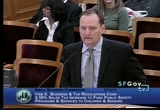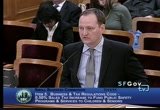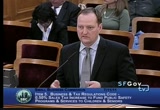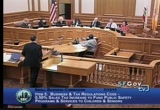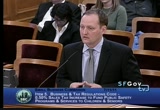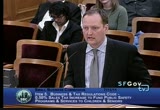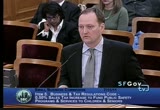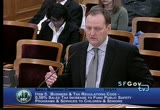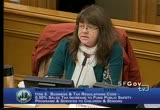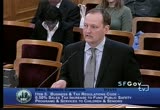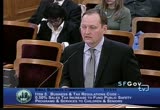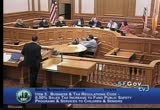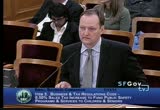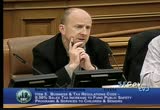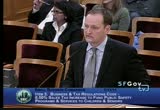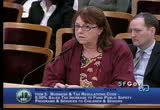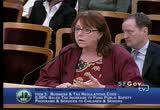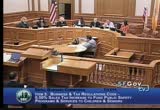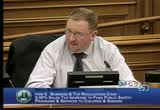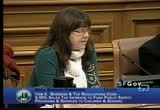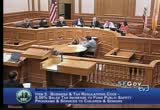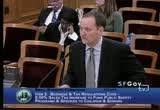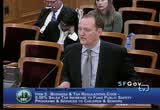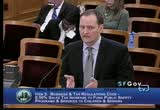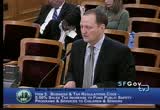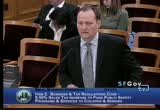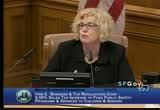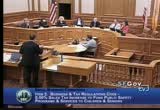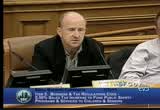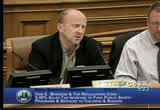tv [untitled] July 23, 2011 1:30am-2:00am PDT
1:30 am
the policy reason for having a point and time in which that link with the state budget is that we don't want to have that level of uncertainty and our city budget tied to a set future policy decisions set by -- if we keep these over the horizon of the ballot measure, you can imagine a scenario where seven years from now we have gone through another business cycle and have had a boon. we have had a new set of policy makers. they have made an adjustment for entirely different reasons. we have seen changes in tax rates and financing strategies
1:31 am
even as part of the democrats budget proposal that was vetoed by the governor. there's a proposal to end the triple flip which is a swath of sales tax and property tax revenues which is complicated. the effect of that to have a 2.5% increase to the local sales tax rate would would have been validated. you can see a lot of different scenarios for the reasons that the state is swapping these rates. the thought was from a policy perspective that we don't want to be connected over the long term to this state once we have gone beyond the foreseeable time horizon where we know with the
1:32 am
incentives are and a set of decisions behind them. we will have 8 different administration. we're concerned about creating a measure that would tie their hands together in the future. those are some of the reasons. this is a good question. there is no science behind the one year. >> i had the same question about the one-year limit. i guess after the first year, if
1:33 am
the state decides to increase the sales tax by 1%, then we will still have to pay a half% -- pay half of a percent. >> if this date increases the sales tax, hours remain intact. to the extent that the commission is concerned about that, i am happy to bring the feedback to the mayor. the other issue is that i think that we have some more certainty about this within the next year. the legislature, some of democrats in the legislature have after their inability to get the tax extensions approved or at least before the voters for a vote have suggested that they might push to put the tax extensions on the november 12th ballot. to the extent that we are going
1:34 am
to see a ballot measure, this is likely to happen. that was still be within the time horizon that we have included in this legislation. i certainly hear your concern and understand it and i would be more than happy to bring that back to the mayor and share that with my discussions with the others. i appreciate that. >> are there any other questions from the commissioners? >> can you tell me what percent of the 12% solution revenue solution this tax represents? >> the 12% revenue is about in year five of the five-year financial plan is about $100 million. the annual value of this tax is estimated to max out at about
1:35 am
$60 million. this is about 60% of that solution. the rest have to come from other sources. >> did you discuss their residential utility user's tax in your discussion? >> yes, that is certainly one of the ideas that comes back and forth into play. i think the issue with that has frankly been the feasibility of getting voter approval of that tax. it would be a new tax. i'm sure you know that's come on and off of the books. but for a recent memory, that tax hasn't existed. there are good arguments on policy grounds for that revenue source as opposed to others, and that it would potentially
1:36 am
provide a price incentive for people to alter their consumption of resources, but i think it would be truly a hard lift to get that type of a measure passed by the voters. the second response to that in terms of why we went with the sales tax versus the residential u.u.t. or the other options that were out there, we did think that this provided something of a unique opportunity, and i think there are also concerns with the sales tax on policy grounds to a certain extent, brothe in terms of the impact potentially on spending and the impact on to what extent the burden is shared on different income groups within the city. but we did think this was a pretty unique opportunity where you had the rate declining by a percentage point and we could place this measure on the ballot
1:37 am
and generate that revenue that we had committed to in the five-year financial plan, but also have a tax rate reduction at the same time. and so that, seemed compared to where we were two weeks ago. and so that seemed like a unique opportunity. and even though there are some other revenue sources that are probably good potential sources to have a policy discussion about, it seemed like because of this unique opportunity that the chance presented itself and we could go forward with something and still be able to say to businesses, to residents that you're actually going to see -- even once this passes, your tax rate reduced as opposed to some of the other possibilities where we would have had to have a rate increase or a new tax altogether. >> my final question is did you have discussions about it being
1:38 am
dedicated to these specific items and why did you decide to keep it in this form as opposed to let it be discretionary in the general fund? >> yeah, that's a great question. so there are two answers. there's the legal answer and the policy answer. the legal answer is that under the state constitution, you can only put a general tax on the ballot, and general tax means just a revenue source that's available for any general governmental purpose and can be allocated at the discretion of the mayor and the board of supervisors. you can only place that type of pressure on a ballot where local legislators are up for election, and that is in the state constitution as approved by voters. so since in november 2011 there are no seats on the board of supervisors that are on the ballot, we can't place a general tax on the ballot.
1:39 am
we can only place a special tax on the ballot and that requires it to be dedicated to a specific use. there's one exception to that where a city can declare fiscal emergency with unanimous approval of the board of supervisors to place a general tax on the ballot, but we didn't think that that was an appropriate course. so in terms of why we chose these specific items, i think there are a couple of reasons. the first is that a lot of these are very kind of core public services that people depend on and value. and we could have chosen from a lot of good services, but we know that each of these are both reasonable services, the public safety and the social safety net, they're reasonable services. nare not going to just go to
1:40 am
waste. and we also know that these services are potential subjects for state reductions. they're kind of usual suspects. when the state balances its budget, it has limited option, just like we do in san francisco. and as a result, it kind of naturally happens that they are forced to reduce certain services and local governments. and we've seen it year after year where we see cuts to the social safety net to health care, services affecting homeless individuals, and in this year in particular, we're seeing a lot of changes in public safety. so we thought that those were good policy reasons and also thought that these would be services that people depend on and that have a big impact and kind of the overall quality of our neighborhoods and the services that people see in the city.
1:41 am
commissioner o'brien: commissioner kasselman? commissioner kasselman: i have a personal anecdote that is pertinent to this situation. about two weeks ago i had a friend walking in the mission district and attacked in a gang-related incident. a whole group of people that i know are now going to avoid the mission. i thank the mayor for addressing the situation. and having grown up in san francisco, it saddens me that now i know a bunch of people who won't go there. as a business owner, those businesses in that vicinity are going to lose, you know, 50 customers. if that happens elsewhere in the city, that could affect us one way or the other. i just wanted to sort of thank that from that perspective. >> thank you for that. i think that excellent reflects the mayor's thoughts on this as well that he's really interested in making sure that we have the services on the street that make
1:42 am
san francisco our commercial districts inviting and welcoming and free of crime and with the services we need for homeless individuals, and all of those considerations. thank you. commissioner o'brien: no other questions from the commissioners, except i'd like to ask a question myself. most of mine were covered by everybody already, but getting back to commissioner clyde's, where you've allocated specifically these funds. so this money exists -- it already exists in the budget and this tax rate we're about to lose. so we come back up by half a percent. is the money going to these services already clearly tracked and that's how we know what's spent on those services? or are we now introducing some new measures in the budget that allows us to see and verify that this is the money that's being spent and put into these services? and is there a way for people to do that in a public domain to
1:43 am
see that that's what's happening to it? >> yeah, absolutely. the revenue from this half cent sales tax will be deposited into a newly created special fund. so we're going to create a fund specifically for that purpose to hold these revenues, and so that there will be a very clear accounting of what they're being used for. so that fund will be created, revenues deposited and expenditures made. so you'll be able to look very clearly into the budget at what's going into and out of that fund to track how those funds are spent. the fund will be administered by the controller under the city's financial policies and it will have all the controls and safeguards that we're required to have and that we want to have when we establish a special fund and a special tax. it will be very clearly tracked and it will be very easy to
1:44 am
determine what these funds are being used for and what they're achieving. president o'baseline: so -- president o'brien: so it's a new level of tracking that doesn't exist today. >> that's correct. >> i like that. i'd like to now open it up for public comment. chris, you want to give them their times. >> members of the public will have three minutes to address the commission. please state your name clearly. >> good afternoon. i'm leslie landhart, i'm the executive director of the union street association. i'm really not speaking with that hat on today. my members did not send me down here to discuss this. they're pretty disgusted about everything that happens anyhow with raising taxes. with the 1% -- i'm speaking from my own business. i have a small business. i've been in business for 33 years in san francisco on the
1:45 am
same street, on union street, and i have seen nothing but -- especially since in 10 years, especially with rates of taxes going up, sales tax in particular. i've seen my business go down, down, down. i was thrilled to see 1% come off the state. that made it 8 1/2 percent rather than 9 1/2 percent. it's subliminal when people go buying. you might own a retail type business where you have goods to sell. people say they have much lovelier shops there and it's 2% cheaper. it's cumulative. i think san francisco has a very bad image with a visitor. i'm sorry to say it. that we are expensive. you can't park.
1:46 am
all in all, you've heard it before, i know you have. i won't belabor the point. i would like to respectfully say this unique opportunity can be negative. and i would ask you to think about that, and as a small business commission, to support a small retailer. you know, there's a lot of tax out there that isn't getting collected. look at people who buy and sell on e-bay. look at people who buy and sell on craigslist. what about the internet? we're starting to see some forward movement there, but you see what's happened with amazon. they don't care. so i would just respectfully say think about it. maybe we shouldn't do that. maybe that would send a very good message to people, that you have to live within your means. i'm trying to. i think the city needs to as well. thank you. >> thank you. do we have any further public comment on this item? seeing none, public comment is closed. this is an action item, i believe, director. >> correct. president o'brien: ok.
1:47 am
commissioners, do we have anybody that would like to put forward a motion? director adams? vice-president adams: i do agree with the woman who just spoke. however, i'm not a big fan of raising taxes, especially for small businesses. but the reality is we are in a financial crisis right now. and i read this over and over over the weekend. it is only a half a cent. they could have gone higher. i like the fact that this legislation is dedicated. it's not going into the general fund. our speaker spoke about -- you know, we are going to be getting a lot of parolees in this town. public safety is a big deal in my district. we have issues right now and we call the police and it takes a while for them to get there.
1:48 am
and it's a big deal. it's just the reality of what's happening in the state of california today. so i will put a motion in support of this half cent sales tax. president o'brien: does anybody want to comment on that first or anybody want to take a vote on that? commissioner clyde? commissioner clyde: i would like to comment before we vote. i too will be supporting this because i do and long have supported dedicated funding for the social safety net. i think that we should have something -- i have children and i don't know how people who have children -- i mean, it's very, very difficult when they're of age and are traveling back and forth across the city right now and you look across -- you look into asia and other cities that are exponentially safer than san francisco. i mean, it's really frightening. so i support that funding. i understand that the state has taken away funding and we're
1:49 am
simply replacing funding that we were dependent on for many years. that also argues for this. i thank the mayor for putting this forward. but i also agree with the woman who just spoke in public comment. personal services are not taxed. commercial rents are not taxed. there are many businesses where we have to start looking together, residents have to get together. there is a residential utilities tax in almost every jurisdiction in california. it's very small, but it adds up. you know, these little things with our 800,000 residents, a very little amount of money could fund some very important programs, like healthy france. so i really think we're going to have to get together and start talking about these revenue measures in addition, sales tax can just not be the only solution, but right now, i'm going to support this. so thank you. president o'brien: commissioner riley? president riley: yes, under the circumstances, we do need to
1:50 am
come up with a solution. but i do have a question. what kind of outreach efforts will you do and what's the response? >> thanks for the question. i think there are a couple of answers we've had. several meetings internally at the mayor's office as we have been thinking through this, we met with small business network, chamber of commerce, a number of stake holders to get their view on this idea. the mayor has also raised this as he has been going out and doing town hall meetings and merchant walks and been trying to talk to people about this and gauge the opinion. i think the response -- first of all, the second part of the answer to that is i think there
1:51 am
is also still a long way to go on this. and that coming here to the small business commission is one of our first steps as we go through this process. so we have introduced this legislation. we're going to go to the board. so we're still in the process of doing more outreach and starting to have conversations with you and then subsequently with others. so part of the goal here is to hear your thoughts and your feedback and there will be more discussions to come. but beyond that, i think what we've heard as we've brought this up with people are similar comments to what we've heard today, that i don't think anybody is thrilled about the position that we're in and nobody takes any joy in having
1:52 am
to place tax measures on the ballot, and everybody is kardashianed about what the impacts of any policy decision we have are going to be on small businesses in the city because i think it's pretty clear, at least from my perspective, that that is not a part of our economy that we can afford to take for granted. and i think the mayor shares that view. with that being said, i think people understand the situation we're in. as a number of you have expressed, that we've got a significant financial short fall and that -- you know, i think one of the things that we've heard that's really important to people is that when we're trying to address the budget problem, we're not just trying to address it by throwing taxes out there. that we are trying to approach it strategically and with a plan that involves a lot of hard decisions and having to ask a lot of different people to take
1:53 am
part in the solutions, and i think it would be a very different story if we were just saying ok, we've got a budget problem, we can't think of what to do, let's just throw some taxes out there. we're trying to work with labor on pension reform and we're trying to cut costs in city government and so we're trying to have a mixed approach. that's been one of the clear pieces of feedback that we've heard from stake holders, that we're open to this, but it has to be part of a broader package of solutions, so we've really tried to take that to heart. and lastly, i think people understand again that it's not ideal, but that there is an opportunity here for better or worse, and i don't think any of us, like i said, is happy about being in this situation or is thrilled about what's going on in sacramento, but but that there's an opportunity here to
1:54 am
have a responsible measure on the ballot that actually takes advantage of the situation in sacramento where we can generate some revenue as part of our plan while still lowering our sales tax rate. so i think that's kind of the big picture similar to what i've heard from the commissioners here today. that nobody is thrilled about it. but that they understand that if it's taken, it's part of a larger package that this is a reasonable approach, and to date, we have heard concerns, but we have not heard organized groups that have come to us and said this is unreasonable, take it away. to the contrary, we've heard most groups say we understand why you're doing this, and it seems like compared to a lot of the other options that are potentially out there that could end up on the balloting that this is abapproach that is
1:55 am
acceptable and that people can support. president riley: you do need 2/3 of the vote. >> we do need 2/3 of the vote, so it's a high hurdle. president o'brien: commissioner dooley? commissioner dooley: i just want to reemphasize what some of my fellow commissioners said, which is you can't keep going to the same group over and over again. the small businesses in particular. you know, they don't have a strong advocacy behind them except for us, and there are a lot of folks out there that are not paying their fair share, and i feel like while we will support this as an emergency thing, i just cannot emphasize more strongly that these other folks have to share the burden too and, you know, we're kind of tired of them paying no sales taxes. that is just wrong.
1:56 am
that then other folks are burdened with a higher tax burden. i really would like to hear from the mayor that those other possibilities are actively being explored, because i think that's extremely important. my other comment is i'm still very uncomfortable with the one-year -- you know, if the state doesn't do it in one year. i would like to hear you go back and extend that for a much longer period of time. if they do this three years from now and folks are not going to want a car, that half a percent of a big ticket item is a real disadvantage. i would like to see this extended throughout the life of the increase. i just think that -- otherwise it could become a burden -- especially people who are buying large items.
1:57 am
>> thank you, commissioner. i absolutely appreciate those comments and understand and will relay them to the mayor. thank you very much. president o'brien: i totally agree with everything that has been said. i think the mayor has managed to engender a lot of good faith and a lot of genuine desire to work with him in these tough budget times. you know, i never thought i would see the day where i'd be even for a second entertaining the idea of a tax. i thought i would never be one of those people. but it's easier when you're just walking down the street to say no taxes than when you're in a position that makes a difference. that said, it is pretty gentle. we are going from reduction -- we're still seeing a net reduction, which i think is really good. and the fact that this is an
1:58 am
integral part of the mayor's budget plan, which i think he's doing a really good job on and everybody's supporting it, including labor and other stake holders. we've got to support this, in my opinion. but i would like to modify the motion on the table to add a line that we do not want to see a situation where that 1% in a year -- i mean, the answer that he gave is probably essentially and necessarily technical in nature regarding legal policy. i kind of half understand it. but if that's the only component that's going to be locked into the uncertainty, what goes on at the state budget, then i'm kind of thinking, well, if we want to remove other things that are unpredictable because of the state, ok. but if this one thing has to be engaged to it, then leave it there for as long as it needs to be there.
1:59 am
and if they bring it back, then it gets removed automatically. i just don't want to leave open the possibility that they can encrease it after 12 months. and we're not protective with a mandatory statement that says we have to take it away. i'd rather see it in there. so i'd like to propose, if i may, to somehow amend the motion that the language is in there that that's locked in there. i don't know how to put that in there. if i could get some help with that. >> i would just saito tally agree with you on that and i agree with commissioner dooley, to purport the motion to help support this. but however, i would like to add in the motion that if the state rescinds the sales tax, that this state tax would go away. president o'brien: without a year lock.
69 Views
IN COLLECTIONS
SFGTV: San Francisco Government Television Television Archive
Television Archive  Television Archive News Search Service
Television Archive News Search Service 
Uploaded by TV Archive on

 Live Music Archive
Live Music Archive Librivox Free Audio
Librivox Free Audio Metropolitan Museum
Metropolitan Museum Cleveland Museum of Art
Cleveland Museum of Art Internet Arcade
Internet Arcade Console Living Room
Console Living Room Books to Borrow
Books to Borrow Open Library
Open Library TV News
TV News Understanding 9/11
Understanding 9/11